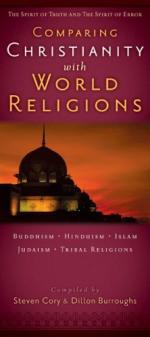|
This section contains 4,532 words (approx. 16 pages at 300 words per page) |

|
COMPARATIVE RELIGION. The term comparative religion broadly signifies the study of all traditions and forms of religious life, as distinguished from the study or exposition of just one. Ideally, and more specifically, it is the disciplined, historically informed consideration of commonalities and differences among religions. Indeed, such cross-cultural or global perspective is entailed in the notion of an academic study of religion.
Comparison is a fundamental mental activity: grouping some things together under a common class or pattern, but also noticing how the examples vary in relation to each other. Such connections and relationships are the basis of thought and science. Without them, there are only isolated, contextless facts. It is on the basis of comparison that generalizations, interpretations, and theories are formed. Hence, comparative frames can create new ways of perceiving and organizing the world.
One cannot generalize about religion on the basis of a...
|
This section contains 4,532 words (approx. 16 pages at 300 words per page) |

|


